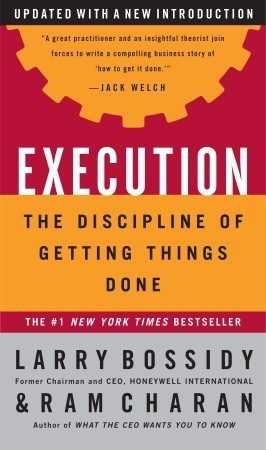More on this book
Community
Kindle Notes & Highlights
Read between
April 28 - June 18, 2020
a major cause of poor execution.
creating a follow-through mechanism, he ensured that everyone would indeed do what they were supposed
If you want people to produce specific results, you reward them accordingly.
The most effective way to coach is to observe a person in action and then provide specific useful feedback.
The skill of the coach is the art of questioning. Asking incisive questions forces people to think, to discover, to search.
leading an organization requires strength of character. In execution it’s absolutely critical.
If you can’t do these things, you can’t execute.
It takes emotional fortitude
courage to accept
points of view that are the opposite
deal with co...
This highlight has been truncated due to consecutive passage length restrictions.
encourage and accept ...
This highlight has been truncated due to consecutive passage length restrictions.
deal with your own we...
This highlight has been truncated due to consecutive passage length restrictions.
be firm with people who aren’t...
This highlight has been truncated due to consecutive passage length restrictions.
ambiguity inherent in a fast-moving, comple...
This highlight has been truncated due to consecutive passage length restrictions.
Such blockages may lead them to avoid unpleasant situations by ducking conflicts, procrastinating on decisions, or delegating with no follow-through.
Emotional fortitude comes from self-discovery and self-mastery.
A solid, long-term leader has an ethical frame of reference that gives her the power and energy to carry out even the most difficult assignment.
Failure to deal with underperformers is an extremely common problem in corporations, and it’s usually the result of the leader’s emotional blockages.
manager who is emotionally weak will avoid such people out of fear that they will undercut his power.
you’re real, not a fake.
Few leaders have the intellectual firepower to be good judges of people, good strategists, and good operating leaders, and at the same time talk to customers and do all the other things the job demands.
Self-mastery is the key to true self-confidence.
They can take risks, and relish hiring people who are smarter than themselves.
The more you can contain your ego, the more realistic you are about your problems.
Humility allows you to acknowledge your mistakes.
Making mistakes is inevitable,
admit and...
This highlight has been truncated due to consecutive passage length restrictions.
No one does the leader’s job flawlessly,
the ultimate learning comes from paying attention to experience.
It requires tenacity, persistence, and daily engagement. It requires reflection and modifying personal behavior.
organization the hardware (strategy and structure)
software (beliefs and behaviors).
ef...
This highlight has been truncated due to consecutive passage length restrictions.
fail
This highlight has been truncated due to consecutive passage length restrictions.
they are not...
This highlight has been truncated due to consecutive passage length restrictions.
business’s ou...
This highlight has been truncated due to consecutive passage length restrictions.
are fuzzy and dis...
This highlight has been truncated due to consecutive passage length restrictions.
To change a business’s culture, you need a set of...
This highlight has been truncated due to consecutive passage length restrictions.
are directly linked to bottom-l...
This highlight has been truncated due to consecutive passage length restrictions.
is practical and completely linked to measurable
basic premise is simple: cultural change gets real when your aim is execution.
First you tell people clearly what results you’re looking for. Then you discuss how to get those results, as a key element of the coaching process. Then you reward people for producing the results.
If they come up short, you provide additional coaching, withdraw rewards, give them other jobs, or let them go. When you do these things, you create a culture of getting things done.
culture is the sum of its shared values, beliefs, and norms of behavior.
When people, especially those at the highest levels of the company, violate one of the company’s basic values,
leader must step forth
publicly ...
This highlight has been truncated due to consecutive passage length restrictions.
Anything less is interpreted as a lack of emot...
This highlight has been truncated due to consecutive passage length restrictions.


